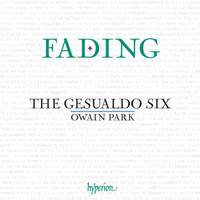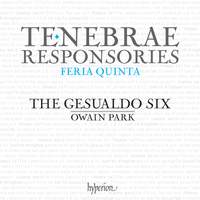Interview,
Owain Park on Fading
 Formed in 2014 for a one-off performance of Lenten music by Carlo Gesualdo, the Gesualdo Six have since developed into one of the most acclaimed consort groups in the UK, with a number of finely-polished recordings exploring both well-loved staples of the repertoire and less-heard works.
Formed in 2014 for a one-off performance of Lenten music by Carlo Gesualdo, the Gesualdo Six have since developed into one of the most acclaimed consort groups in the UK, with a number of finely-polished recordings exploring both well-loved staples of the repertoire and less-heard works.
Firmly in the second category is Fading, from 2020 – a choral "concept album" which takes as its inspiration the ancient Office of Compline and the gradual movement from evening, through night, into morning. It weaves together a wide array of ideas and draws on many disparate musical elements, including four lullabies by the Estonian composer Veljo Tormis.
With another album out shortly – returning to their Gesualdo roots with the troubled Renaissance composer's Maundy Thursday Responsories – I caught up with the Gesualdo Six's director Owain Park to talk about how the unorthodox Fading fits into the group's broader approach.
This album draws together various threads – the Compline service, lullabies, light, darkness and the natural world. Was there one single starting-point that it all grew from, or did it take shape from several angles at once?
The CD programme came out of our first tour to Canada in 2018, when we put together some works that we thought would work well in the cathedrals and churches we were performing in. A lot of our concerts were late at night and we wanted to capture the atmosphere of a candlelit building. Quite naturally, this linked in with the service of compline, an occasion that’s quite special to many of us having sung as choristers around the UK. So much of the mood is found in flickering shadows and splashes of colour; I wanted to bring a selection of works together that felt as though they could belong here, while still being approachable as concert works or on a CD playlist.
The late Veljo Tormis is not widely known outside his native Estonia – a country that most classical fans will, perhaps forgivably, equate solely with Arvo Pärt! How did you come across these four evocative lullaby settings?
I was put onto these works by Stephen Layton, who has championed the music of Pärt and Tormis in his programming. These simple arrangements of folk melodies are absolute gems, serving as brief interludes, or even pauses between longer and more expressive works. I find that they evoke an almost childlike innocence, capturing an intimate moment as a child in its parent’s arms drifts off to sleep.
The two North American composers Sarah Rimkus and Gerda Blok-Wilson, featured toward the end of the album, may also not be familiar to many listeners – do you consider it part of your “mission” to showcase lesser-known works and composers?
It is so exciting that a tradition that has been around for centuries is still evolving and changing. We want to be part of this in our own small way and I try my best to search out and facilitate the writing of new works. We have recently commissioned composers including Héloïse Werner, Kerensa Briggs, Richard Barnard and Deborah Pritchard, and we are always on the lookout for opportunities to collaborate, recently working with Multitude of Voyces to champion and record works by female composers.
Compared to some other settings of Phos hilaron, your own has a certain lonely, even desolate quality about it. What led you to approach the text in this way?
I wrote this setting for a service of compline at Trinity College Cambridge. I was always amazed that this late night mid week service was so popular with the students – perhaps something to do with the quiet, reflective atmosphere at the end of busy day. I found this ancient chant online and wrote a simple accompaniment – each cadence is just a little different so that it remains searching rather than comfortable. I eventually expanded the work to become a 9-minute composition in multiple parts, but this short setting provides the impetus and inspiration for the entire work.
The second of the two contemporary Arab poem settings, Seeds in flight, seems to act as a fulcrum on which the album pivots from darkness into more sunlit territory. Was that intentional from the outset, or did it just turn out that way?
I would love to say that it was deliberate, but a wise (old) record producer once advised me to not set my heart on an order until everything was “in the can”. I did wish for the album to end on a positive note, and so pieced together the final tracklist a bit like doing a jigsaw towards the end of the process. I’m pleased with the way the different styles and periods mould together; I think this interaction adds another layer which is a little more subjective, and therefore more personal, to the listener.
Do you think your future albums might be constructed in a similar way to this one, weaving together a few strands of thought rather than focusing more squarely on a period or school of composition?
I think there will be room for this sort of concept again (actually, I know there is one on the way in 2022 – ‘Lux aeterna’), but it is also helpful for the listener sometimes to know exactly which pieces or composers they’re getting. So there will be a balance to our future recorded output, and I hope to that end that people will come back for more!
The Gesualdo Six, Owain Park
Available Formats: CD, MP3, FLAC, Hi-Res FLAC, Hi-Res+ FLAC
The Gesualdo Six, Owain Park
Available Formats: CD, MP3, FLAC, Hi-Res FLAC, Hi-Res+ FLAC




